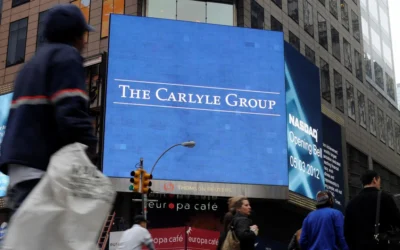Market chaos opens way to cheaper assets but scarce financing likely to limit acquisitions
A mix of fear and optimism is sweeping through the private capital industry.
“I’m not happy about the people that are sick,” said a Wall Street executive, speaking from the secluded neighbourhood where he and others are hoping to ride out the coronavirus outbreak.
But he is also not sorry to see the back of a long boom in financial markets, when investors complained that so much money was chasing too few deals and attractively priced assets were hard to find. “The world appropriately compensating people for risk — yes, I am [happy about that],” added the executive.
This month’s financial turmoil should have been a moment for private equity firms to savour. Over the past decade they have persuaded public pension systems, sovereign wealth funds and other investors to commit record amounts of cash to the sector. The result is a $2.5tn war chest for investment strategies that range from building real estate and infrastructure to funding loans for midsize businesses and taking over enormous corporations. Putting all that money to work has been difficult. Now, with plenty of cash on hand and markets in free fall, many rainmakers believe they are finally set to strike the deals of a lifetime.
Yet for others, the sense of opportunity is tempered by a dilemma. Yes, assets are cheaper, but some private-equity owned companies are facing ruin. Meanwhile, the industry’s $2.5tn of committed capital has to be called up from potentially skittish outside investors and primed with trillions of dollars of now-scarce acquisition financing. All of this means that — at the crucial moment — the powder may turn out not to be so dry after all.
“It feels like the world is falling apart,” said Raymond Svider, chairman of BC Partners, a €22bn London-based firm whose portfolio companies sell everything from dog food to satellite broadband services. “Most of us who have been there before would love to put money to work and be opportunistic. [But] there is no debt available right now to finance acquisitions,” he added. “Plus we all have portfolio companies which are experiencing unprecedented situations and which we have to focus on.”
If there is money to be made amid the financial wreckage of the coronavirus crisis, then among the first to try to claim it will be the debt-focused funds that have supplanted banks as chief lenders to a swath of medium-sized businesses.
“We’re investing in [companies] that might have liquidity problems,” in sectors such as travel, restaurants and cinemas, said one credit-focused executive. “We don’t think the business models are going to evaporate.”
Private debt funds usually charge higher interest rates than banks. But “the fact that we’ll try to figure out something, and actually do it right now, is really valuable”, the executive added. Much of his fund’s cash comes from institutional investors who are locked in for years, enabling it to keep lending in choppy markets that force banks to retreat.
“It’s worth starting to spend,” said Howard Marks, the billionaire co-founder of Oaktree Capital Management, the world’s largest investor in distressed assets. He has warned for years that overconfident lenders were falling over each other to write cheap and risky loans. “When people are risk-oblivious, we should be terrified,” he added. “But on the other hand, when they’re terrified, we can be aggressive.”
If a downturn spells opportunity for Mr Marks, for some of his counterparts at buyout funds, it promises trouble. Private equity firms have made investments in everything from theme parks (Blackstone’s Merlin Entertainments) and holiday companies (Apollo’s Diamond Resorts) to casual dining chains (Hony Capital’s PizzaExpress) — all sectors that will be hit by “social distancing” policies intended to curb the virus’s spread. At some firms, executives have spent the past week “assess[ing] existing portfolios, taking a look at what their liquidity needs might be”, said Morri Weinberg, a partner at Ropes & Gray, a global law firm.
For others, new deals will be a priority, said Dan Zilberman, head of Europe at private equity firm Warburg Pincus — once the safety of staff is assured and portfolio companies are taken care of. “We’re obviously going to be thoughtful, but we’re here to invest,” he said. “We can look past short-term events and take a view on the long-term value of companies.”
Similarly, Swiss private equity firm Partners Group will look to buy public companies that were “prohibitively expensive” before the financial tumult of the past few weeks but which “may look more attractive today if valuations remain at these levels”, said David Layton, co-chief executive officer and head of private equity, on an earnings call on Tuesday.
He said Partners Group was also planning to approach owners of “solid assets” with “proposals for capital if they need it”. The firm was targeting high-quality companies that could benefit from long-term trends, rather than “distressed or troubled investments,” he said.
Other groups are also being opportunistic. Phones have been ringing “off the hook” with private equity dealmakers wanting to snap up public companies, said one senior investment banker, “because everything is cheap”. Some buyout firms are being egged on by activist investors, who are eager to force sales amid the chaos.
But closing deals is likely to prove difficult. Logistically, it is disrupted by dealmakers working from home, and site visits for due diligence becoming impossible.
And many private equity executives are resigned to having to use their own capital to cover a bigger share of the price of any new acquisitions, if they can find a lender at all. A few buyout executives fret that their investors might have trouble coming up with cash needed to meet capital calls — although Mr Weinberg at Ropes & Gray said that even in 2008, such worries almost always proved unfounded.
Perhaps the most stubborn obstacle of all is the enduring optimism of the sellers. In a falling market, “you’re only going to buy at tomorrow’s price”, said another private equity executive. “And [the seller] still wants yesterday’s price. So in the first two, three or four months when things fall, everything just stops.”
That is a scenario that rings true to many buyout veterans. Whether because of the ailments of their own investment portfolios, or the virus spreading in the world beyond, “the shutters are coming down everywhere”, said a top dealmaker at a large private equity firm. “It’s going to be a slow, weird year.”
Source: Financial Times
Can’t stop reading? Read more
Carlyle and Goldman Sachs open private credit funds to Willow users with $10,000 minimum
Carlyle and Goldman Sachs open private credit funds to Willow users with $10,000 minimum Carlyle,...
EQT, PAI, and Stone Point shortlisted for €2bn takeover of Castik-backed Global Group
EQT, PAI, and Stone Point shortlisted for €2bn takeover of Castik-backed Global Group EQT, PAI...
CAIS Advisors unveils retail vehicle giving investors a stake in elite sports and media
CAIS Advisors unveils retail vehicle giving investors a stake in elite sports and media Eldridge...




